Alicia’s Stage 4 Desmoid Tumor Soft Tissue Sarcoma Story
Alicia shares her stage 4 desmoid tumor sarcoma story, diagnosed when she was only 15 years old. She details undergoing extensive treatment, including surgery, radiation, chemotherapy, targeted therapy, clinical trials, and an amputation surgery.
In her story, Alicia also shares navigating how to ask for help during such a difficult time, the support that helped the most, and the transition to survivorship. Thanks for sharing your story, Alicia!
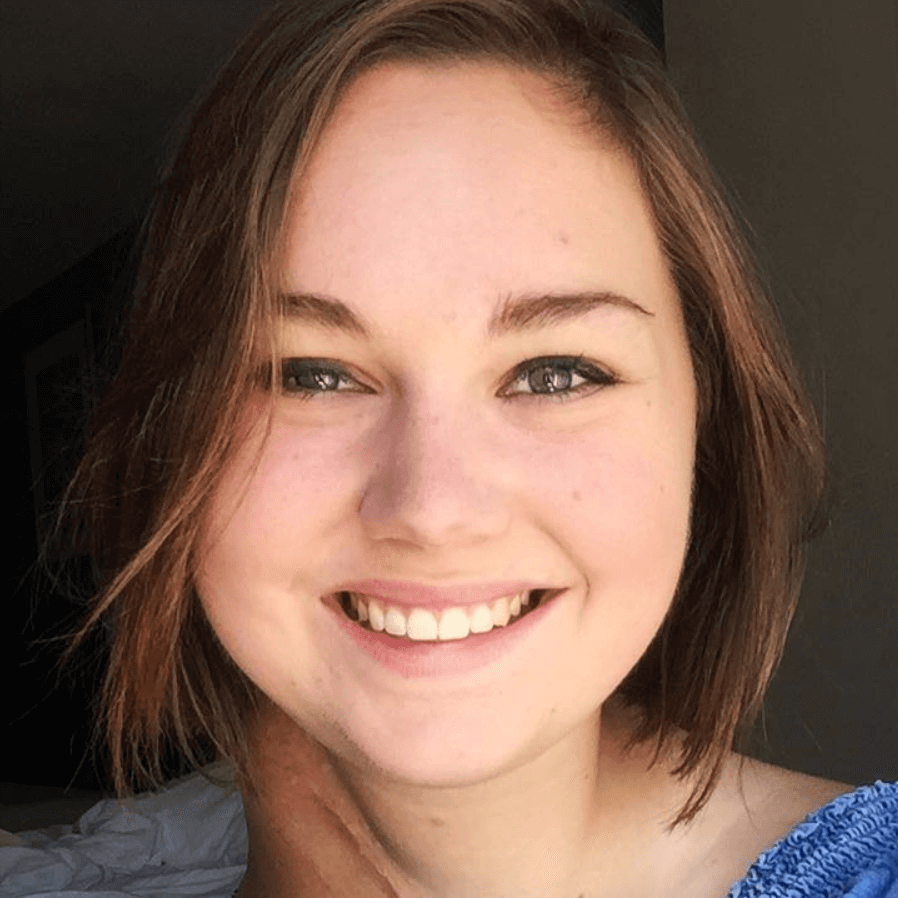
- Name: Alicia B.
- Diagnosis (DX):
- Desmoid tumor
- Soft tissue sarcoma
- Staging: 4
- Age at DX: 15
- 1st Symptoms: Lump in right armpit
- Treatment:
- Surgery
- 1st tumor removal
- 2nd tumor removal (with radiation)
- Radiation therapy
- 5 weeks, localized to right chest
- Chemotherapy
- ADIC ~10 weeks
- Vinblastine & methotrexate ~ 7 months
- Selinexor & topotecan ~ 10 weeks
- Targeted therapy
- Tamoxifen
- Sorafenib
- Sulindac (anti-inflammatory drug)
- Clinical Trials
- Various trials for ~16 months
- Amputation surgery: right forequarter amputation
- Surgery
This interview has been edited for clarity. This is not medical advice. Please consult with your healthcare provider for treatment decisions.
You don’t have a choice when you get sick. Cancer doesn’t say, ‘Are you ready?’ It just happens.
The biggest decision you have is how you respond and what your attitude is going to be. You choose that every day.
I have tried to always remain positive, loving, and kind. It’s not always easy, especially when you’re in pain, but it will get you through.
Alicia B.

Diagnosis
What were your first symptoms?
I was in high school just being 15. I remember the week before the semi-formal dance, I felt a little bump in my armpit area. I’d been very healthy my whole life. Finding it was kind of bizarre, and I immediately jumped to thinking, “There’s something wrong with me.”
It’s interesting to have a moment like that where you sit and think about what it might be. Cancer popped up in my mind. I went to some doctors locally here in New Hampshire. None of them knew what was going on. It was misdiagnosed a lot.
Getting a biopsy
It took months for someone to say, “This could be a tumor, so let’s do a biopsy.”
I had a surgical biopsy, and the doctor told me I had a desmoid tumor. He never used the word “cancer.” I never had a “I have cancer” moment. I just knew I had a tumor. That led to a lot of me trying to understand what was going on medically and to find the right doctors to help me.
That’s how everything started. It wasn’t until I went to Mass General in Boston that they started really explaining everything to me and using “cancer” in conversations.
Tumor growth
With this type of tumor, it doesn’t metastasize through your blood, so it doesn’t affect the rest of your body the way most cancers do, but since it’s in a connecting tissue, it can spread through different parts of your body that way.
For example, my tumor started in my armpit. That’s when it was found in 2010. Six years later, when it was the largest it ever got, it was in my shoulder, arm, breast, neck, and chest, too.
When it was first being treated, it wasn’t being treated like cancer. It was treated as a benign tumor. It shaped the way I was treated the first couple of years.
How did you process the cancer diagnosis?
Identifying with the phrase ‘I have cancer’ was hard because no one initially told me that.
There wasn’t a moment for me. It was more gradual. First it was a tumor, then the tumor did cancer-like things, and not until later was it talked about as a type of cancer.
»MORE: Processing a cancer diagnosis
Breaking the news to loved ones
That made it really hard to tell people. The thing I dreaded the most was the reactions of people around me. The scariest part was the idea of telling people and feeling their worry and concern.
It took me a long time to sit down and face what I was going through. It’s odd that putting a name to it made it more approachable, but it did. When I started coming to terms with having cancer, that’s when I started reaching out to people.
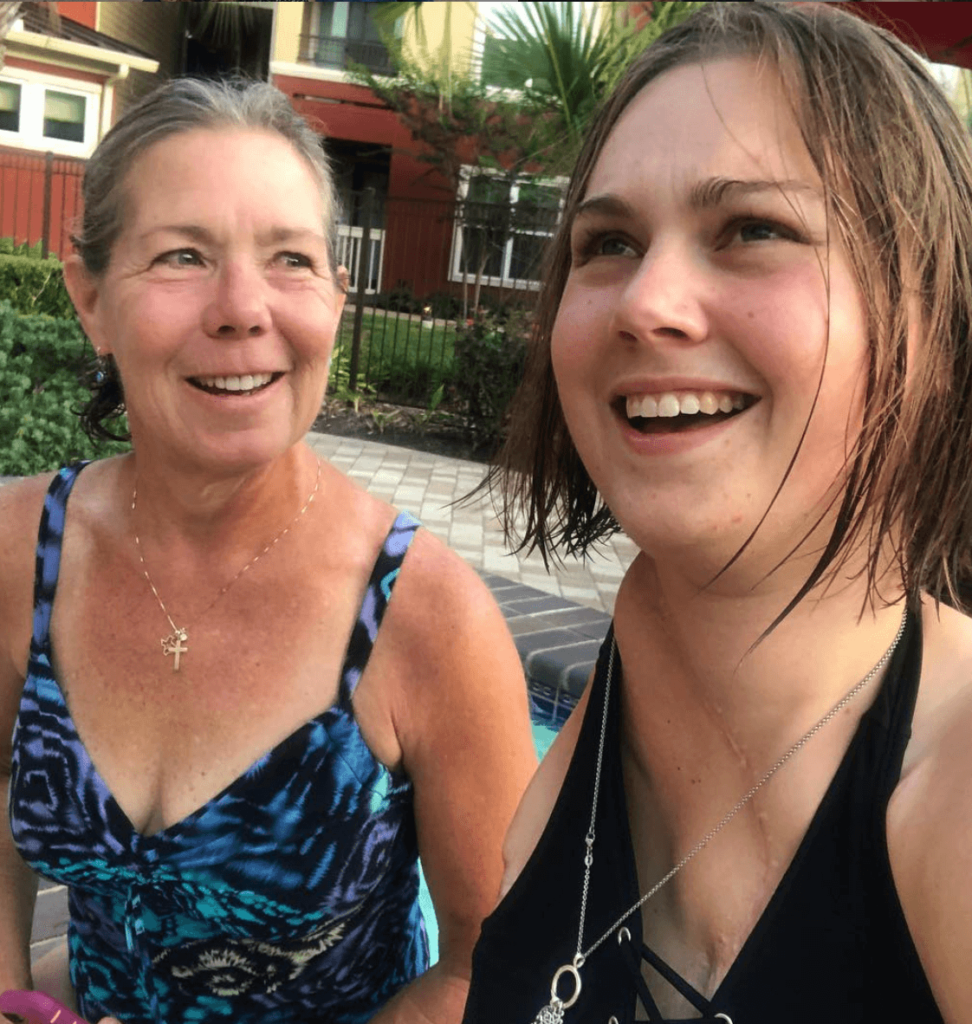
Treatment
Treatment decisions
I had three different occurrences, or it helps to think of it that way anyway. The first time I found the tumor, the doctor just wanted to remove it surgically. They said they would take it out, and I should be good.
I wasn’t seen by an oncologist at that time. My doctor was a surgical oncologist who dealt with sarcomas, but it was approached differently than a lot of other people’s cases.
Describe the first surgery
That first surgery was definitely a big surgery. The amount of tumor they took out and the way they cut was a lot. That area lost function pretty much.
I never got full mobility back. That was the beginning of the area really starting to break down.”
I recovered from surgery, I thought it was gone, and I was living my teenage life when I noticed the bump coming back again.
Second occurrence
We did the same thing, except they did surgery and radiation. I was finally in a cancer center. I realized I was dealing with cancer then.
We dealt with it, and I thought it was gone by the time I ended high school.
Third occurrence
That’s when I decided to pack up my things and move to Texas. I was a freshman at Texas A&M. When I was down there, I lived away from my family.
Luckily, my sister was there with me as a kinesiology major. It was during my first semester of school that I had the same sinking feeling, and I knew something was wrong in that area.
Treatment for third occurrence
It was two years later when I found it the third time. That tumor ended up growing for four years. I went through a long laundry list of different treatments.
I did chemo, targeted therapy, clinical trials. Basically, I did every possible option except surgery. Surgery was the last option.
They were saying that if it came to surgery, it would be a massive one, so we were holding off.
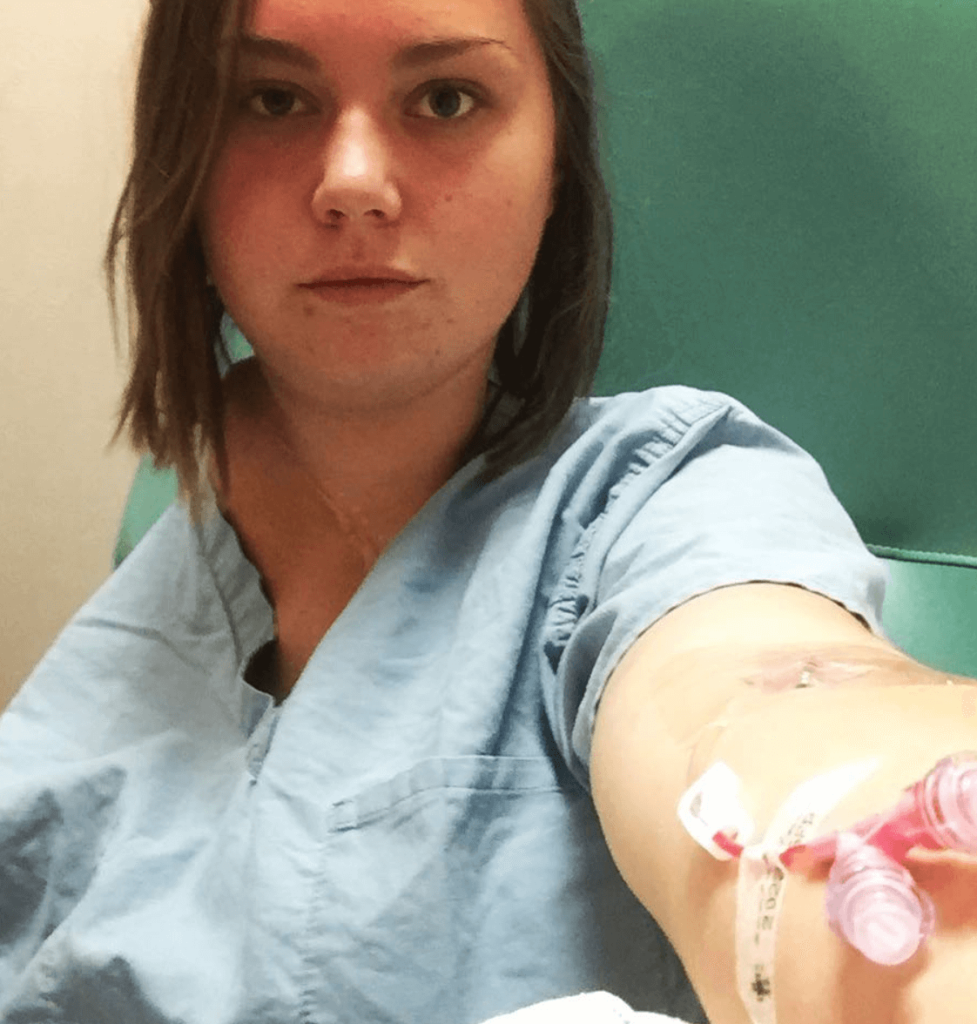
Describe the chemotherapy
With chemo, I had the typical experience you could expect. I went in once every two weeks. I lost my hair. I felt like shit. I dealt with that for a few months, and it didn’t work.
I switched to a different chemo. That was weekly. I went to class all week, go to chemo on Friday, heal on the weekend, and repeat.
I was trying to be a patient and a student, and I still don’t know how I did it, but I have a bachelor of science.
Clinical trials
I tried to do all these different treatments, and that led to the clinical trials. I loved my doctors. I was at MD Anderson at that point. It was great. I knew I was in the best hands.
The trial was one of the most challenging times because trials are so demanding and controlling. It really overtook my life. I was driving two hours over there weekly.
Reaction to the treatments
The tumor was about the size of a watermelon at this point, and none of the treatments or trials were really working. I didn’t have much mobility at all.
There was a lot of pain. I was on narcotics and had been since I was a teenager. My body reacts negatively to them. I tend to get really nauseous.
The pain became unbearable, and that’s when a lot of mental health issues popped up. I didn’t even want to be alive because I was just in so much pain.
The last trial I was on was a drug therapy and chemo, and it destroyed me. I looked at my mom, and I said, ‘I can’t do this anymore. I need another option.’
Amputation Surgery
The decision to pursue surgery
That’s when I got in touch with my surgeon again. I liked her a lot. I told her, “We need to do something because nothing is working.” Surgery was the next best option.
I remember at the first appointment, they said, “Surgery will include the removal of the tumor, your arm, your shoulder, six ribs, your breast, part of sternum, and part of your neck.”
It was very shocking to hear. I drove back to College Station and spilled everything to my best friends. I didn’t know what to do.
It took months to make the decision. It wasn’t easy, and I didn’t decide it lightly. It took so much sitting and reflecting. Eventually, I came to the decision that surgery was my option.
I immediately knew it was going to be the hardest thing I’d ever done. Thankfully, I had an amazing team both medically and personally.
Going into the surgery, I felt confident about my decision, it was still terrifying. I had no idea what was going to happen. I had been right-handed my whole life. The thing is, though, that arm was in a lot of pain and lacked almost all function anyway.
It wasn’t like I was losing a healthy arm. All I cared about was getting the tumor out of my body. All I could think about was waking up without it.
How was the surgery and recovery?
It was a 17-hour surgery. I don’t remember any of it. I know that was a hard day on my family and friends. I can’t imagine sitting there for 17 hours.
I barely remember waking up in the ICU, but I do remember it was really challenging. It took months to recover. I was in the hospital for a total of two months over the course of a few visits.
Every day, I was just trying to heal. It was so much waiting. I just had to be patient. My parents, siblings, and friends were all with me. I had a lot of love and support, and that kept me going.
It was a lot of trauma physically and mentally. I tried a little harder every day. I did things to heal myself, and slowly I started getting better.
I had to work for it, but eventually I found out how to make things work.
My mom and I lived in an apartment in Houston for a few months. Occasionally, we’d have to do a gross medical thing or two, but most of the time, we just hung out.
Then I moved back to College Station with my roommates, and even if all I did one day was just go through the drive-thru somewhere with them, that was a good day.
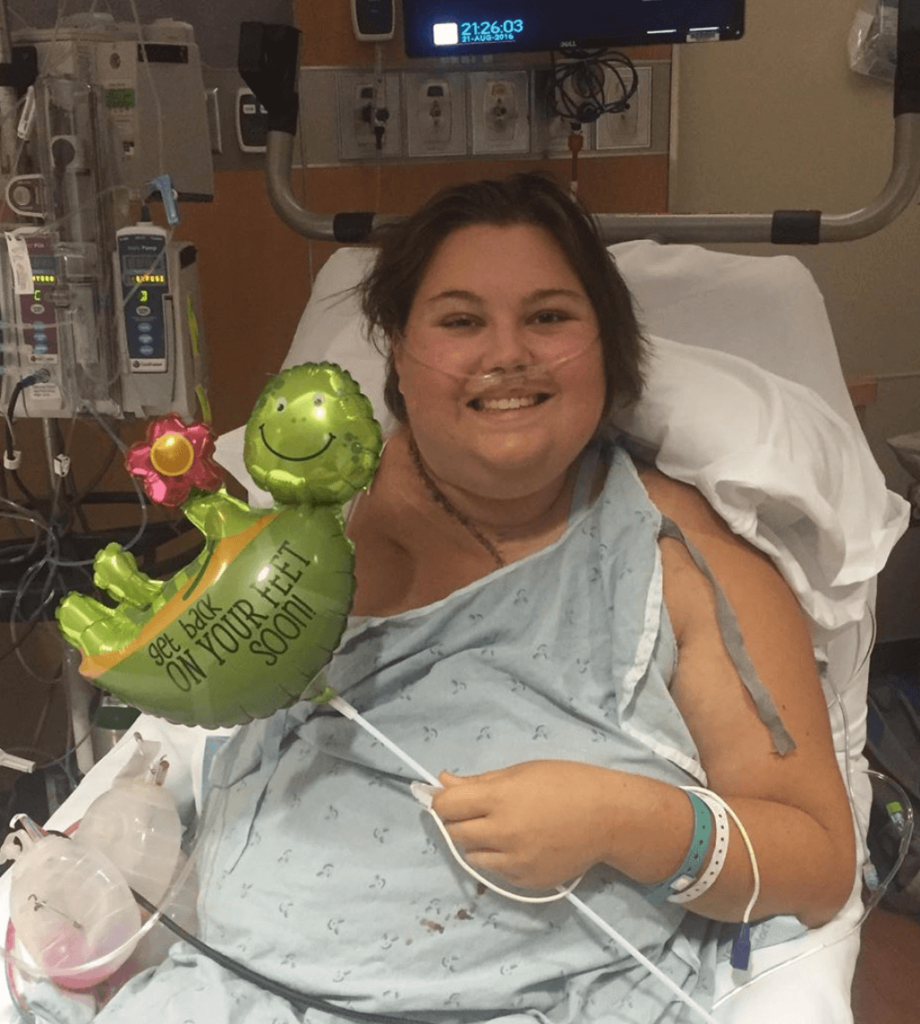
Taking a break from school
One of the hardest things about it was taking a year off of school. Life was moving around me, but I was stuck. I wanted to do certain things, but I couldn’t.
That was the beginning of trying to face my abilities and learning what it means to feel capable.
Mental and emotional recovery from surgery
I started healing, I became a real human again, and I started doing real, human things like the dishes and taking care of my cat.
That’s when the second wave of reality hit me. I realized how different my life was, but I knew I could rally again.
I learned to accept that I was never going to be the same again. I had to work to accept a major change in myself, and it was a dramatic change.
It was hard going places because people looked at me differently. I had never known what it was like to have a physical disability.
Having cancer makes you feel like you have a disability, but most people wouldn’t know because you can still do certain things.
Here I was with a physical disability that inhibited me from doing things because I was missing the tool I needed to do things like open a bag of chips.
It was little things like that that started to wear on me, but then there was this other part of me that was like, ‘Oh my god, I don’t have cancer.’
I was trying to hold onto that. It was like, yeah, I’m having a real hard time getting this toothpaste on this damn toothbrush, but at the same time, I noticed that I was feeling better.
I had the energy to brush my teeth. I just had to shift my perspective. I couldn’t focus on the things I couldn’t do. I had to ask myself what I could do that day. The more I started thinking that way, the better I started to feel.
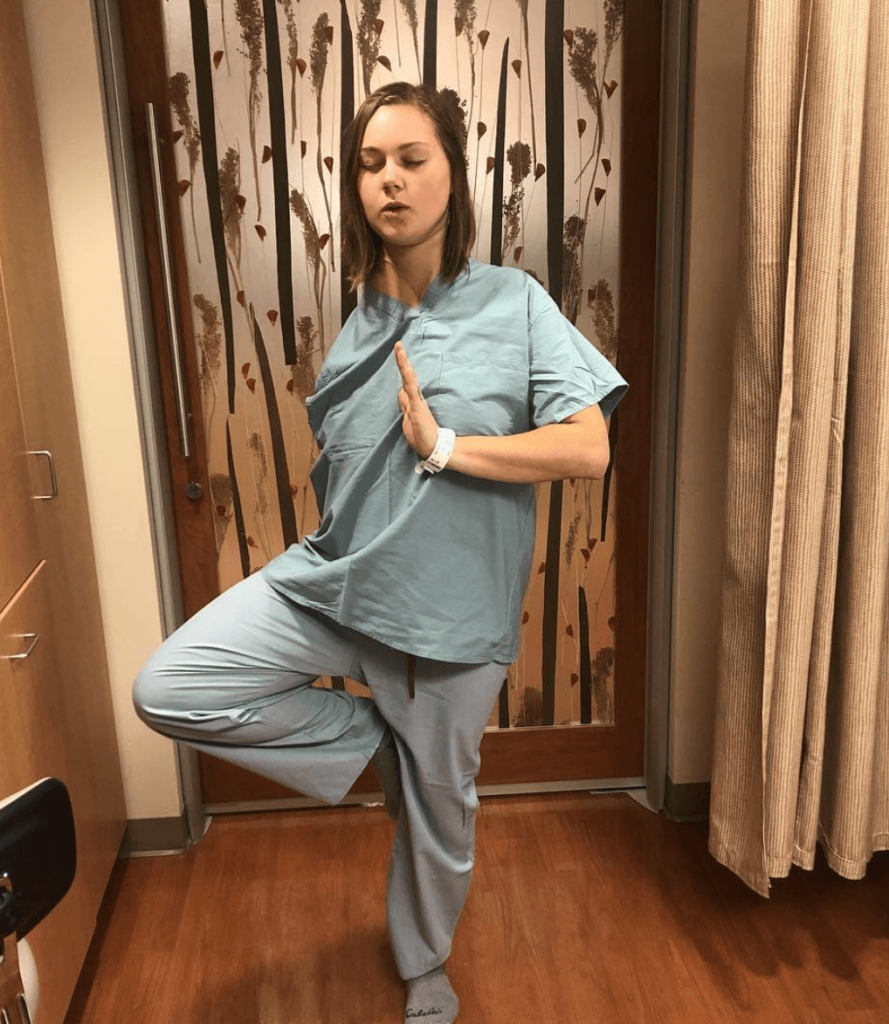
Reflections
How has survivorship been?
It’s been years. I still feel like I’m healing and recovering, but at the same time, I surprisingly feel as healthy as I ever have. I practice yoga a lot these days, and I can bend in some fun ways.
I can do things that a lot of other people can’t do. I can put my leg above my head with no problem. Other people can’t do that. I’ve started to understand that everybody has different abilities.
In some ways, we all have some disability. For some people, it might hardly exist, but everyone’s got something.
My disability is challenging but empowering. I’ve been inspired by some people, and I hope I can do that for others.
I have a full-time job. I’m trying to just live my life. Every single day, I’m reminded of what my body has been through. It’s hard to think about that tumor and it being the reason I only have one arm, but that surgery saved my life.
This option, living one-handed, will always be better than being dead. I’d take that deal any day. I try to appreciate every day. That makes me a happy person and keeps me positive.
Cancer sucked, and it’s the worst thing that’s ever happened to me, but it taught me things that I would never have learned otherwise.
Have you found it difficult to ask for help emotionally?
With fear, it’s hard because I dealt with a lot of it on my own because I knew it was going to affect the people around me, too.
I’ve spent my whole life just trying to find a balance of things I’ll carry alone and things I’ll let other people help me carry.
When you’re dealing with heavy stuff, you feel alone in it. When the emotion starts to weigh down on me, that’s when I have to open about it even if I don’t want to.
I know that sharing will help, and I know that people want to help. In some ways, I think I hurt people around me because I didn’t tell them things. It’s all a balance.
How were people able to support you?
I have my immediate family. We’re all close. I received so much support from them financially and emotionally. As a college student, though, a lot of it came from my peers.
In high school, it was mainly my family that took care of me. I had a few close friends that would drive me to appointments, but I didn’t share much back then.
When I got to college, I was very independent. That first year of school when the tumor came back was probably the most isolating time period.
That’s when I met another young adult cancer survivor.
»MORE: What kind of support cancer patients say helped the most

Finding support within the cancer community
Talking to the other young adult cancer survivor and meeting him was so helpful. He’s the one that told me to go to MD Anderson. I probably would’ve found them on my own, but the fact that a suggestion from him changed a lot of things for me is neat.
With a lot of the young adult cancer survivors, I’ve gotten so much support and experienced so much connection. In my job, I see a lot of cancer survivors. Because of our common experience, we relate to each other.
That human connection is one of the most important things for me. Hearing somebody say, ‘I get that,’ is so impactful.
»MORE: Join other patients and caregivers on The Patient Story Instagram
By my sophomore and junior year of college, I made some really close friends. They were the ones that were with me at the time of the surgery. It was traumatic for all of us.
What was the most helpful kind of support from people?
I realized when I told people about things, they really wanted to help, and when they followed through, it was amazing to see.
It was so cool to see people step up. I loved getting messages and cards. I have a bunch of my cards in my room.
I had to tell every single human I’ve ever met that I was going to lose my arm. I was like, “How in the world am I going to deal with this?”
When you tell people something that massive, you have to prepare for an equally as massive reaction. I was fascinated by the people who reached out to me and wanted to support me.
There were times I reached out for financial help, rides, or practical things like that, and I was always impressed by the way people stepped up. I saw a lot of good humanity.
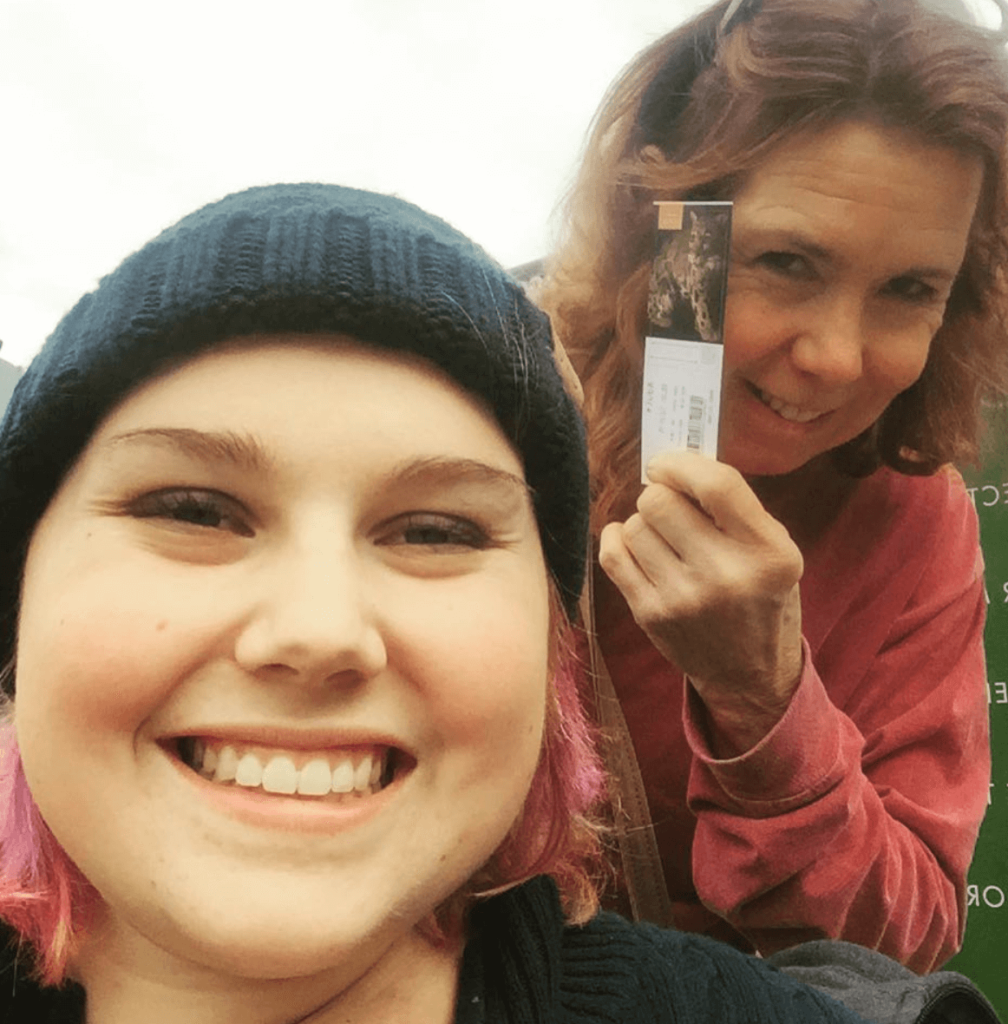
Advice for someone who has been diagnosed
When you’re dealing with something like this, it’s overwhelming. When I thought about the reality of my tumor, it was just too much because I was thinking about everything that had happened already and might happen.
I have found the most peace in moments when I am present. If in the current moment, I can be happy, that’s what I hold on to.
I get stressed out about the future, and I’m usually prepared, but you can’t do that with cancer because there are a lot of unknowns.
You can’t stress about the past or the future. You just need to focus on the present and be positive about what you have.
I could spend all day focusing on the things I can’t do and the things that frustrate me, or I would spend all day thinking about the things I can do and things that make me happy.

You don’t have a choice when you get sick. Cancer doesn’t say, “Are you ready?” It just happens.
The biggest decision you have is how you respond and what your attitude is going to be. You choose that every day. I have tried to always remain positive, loving, and kind.
It’s not always easy, especially when you’re in pain, but it will get you through.
Always believe you will survive. Smile every day. Give joy and love and focus on those things. Give those things to yourself as well. Self-love is important. Even if your body is breaking down, you have to love it.

Inspired by Alicia's story?
Share your story, too!
Desmoid Tumor Stories
Ashley W., Desmoid Tumor
Cancer details: Rare, <3% of all soft tissue tumors, more common in women
1st Symptoms: leg tightness, increased swelling in leg
Treatment: Chemo infusion (Methotrexate, Navelbene), oral chemo (Nexovar)
...
Demi D., Desmoid Tumor
Cancer details: Rare, <3% of all soft tissue tumors, more common in women
1st Symptoms: fatigue, lump in hip
Treatment: Surgery, radiation, chemo
...
Alicia B., Desmoid Tumor, Stage 4
Cancer details: Rare, <3% of all soft tissue tumors, more common in women
1st Symptoms: lump found in right armpit
Treatment: Chemo, radiation, targeted therapy, clinical trials, surgery, including forequarter amputation
...
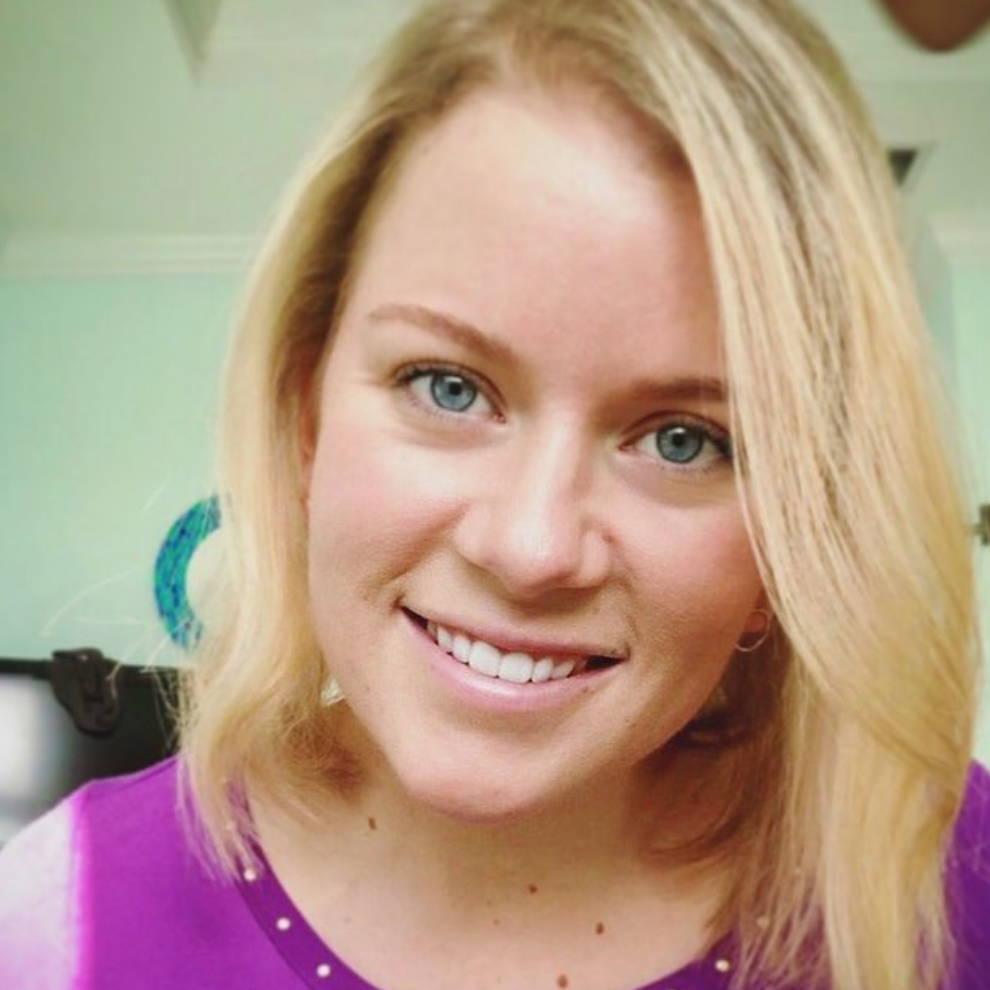
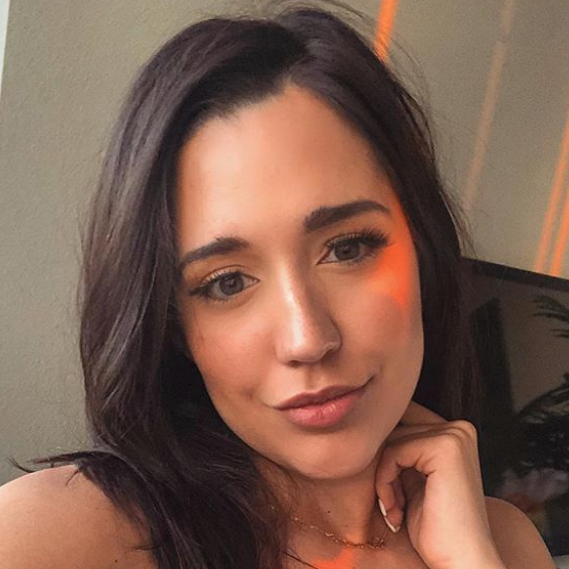
2 replies on “Alicia’s Stage 4 Desmoid Tumor Soft Tissue Sarcoma Story”
Hello,
Thank you for sharing your story. I recently discovered a recurrence in my ribs. I am anxious and feeling lonely.
Please contact me. I have so many questions for my niece.